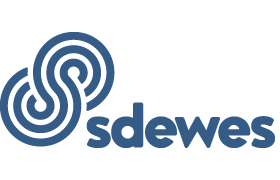
SDEWES INDEX
related metrics presents an opportunity to trigger policy learning, action, and cooperation to bring cities closer to sustainable development.

Project objective
The project aim was to empower the local and regional government bodies and civil society with better understanding of the role of clean transport within energy transition and provide tools for decarbonization of transport.
Background
Electrification of transport, apart from handling the local problems of pollution in urban areas, also has a significant role in energy transition towards zero-carbon energy systems based on renewable energy sources. This is recognized in strategic documents, such as NECPs, national strategies of Low-carbon development and development of energy system. However, concrete measures need to be put in place on the local level to facilitate the achievements of national and EU targets from Clean Energy Package.
Implementation
Alpe-Adria clean transport alliance gathered the network of decision makers and relevant actors that can take action for local decarbonization of transport. A tailormade toolbox has been created, based on the four white papers (which map the current condition and capacities of local governments in the countries of the project implementation) and created according to the feedback collected from the over 120 relevant stakeholders in all the participating countries through 12 events. The toolbox will be used to achieve similar standard in all countries of the project’s implementation. Participants received training about the toolbox, the choice awareness theory in choosing and elaboration of measures for the electrification of transport and maximization of synergies with other sectors (e.g. power generation system and making use of locally available renewable energy sources) to achieve decarbonization in their community. In such way, the road decarbonization actions are set to become the new standard on local level throughout the Alpe-Adria region and the east coast of the Adriatic.
Lead partner: SDEWES Centre – International centre for sustainable development of energy, water and environment systems
Partners in the project:
The duration of the project was 20 months. Project started with implementation on 1st of November 2020 and lasted until 30th of June 2022.
The project benefits from funding from European Climate Initiative (EUKI). EUKI is a project financing instrument by the German Federal Ministry for the Environment, Nature Conservation and Nuclear Safety (BMU). It is the overarching goal of the EUKI to foster climate cooperation within the European Union (EU) in order to mitigate greenhouse gas emissions. Total budget of the project is 376,826.00 €.
Join the Alpe-Adria clean transport alliance
Supporting the bottom-up road transport decarbonization for local level decision makers: a White paper (AUT, HR, MNE, SLO)
Alpe-Adria Clean Transport Alliance toolbox for download
1st project workshop „Fostering the zero-GHG emissions transport – experiences of decision makers on the local and regional level“
The first project workshop was held on 17th of December 2020 in organization of SDEWES Centre, Energy Agency Styria, Regional development centre Koper and University of Montenegro, Faculty of Mechanical Engineering. The event targeted the stakeholders from Split-Dalmatia County in Croatia.
Mr. Antun Pfeifer, SDEWES Centre: Alpe-Adria clean transport alliance project presentation
Mrs. Irene Hofer, EAS: Electrification of transport in Austria with a special view on the state of Styria
Prof. Radoje Vujadinović, UoM: Research and implementation of clean transport solutions in Montenegro
Mr. Mitja Petek, RDC Koper: Development of clean transport on the local level in Slovenia
Mr. Martin Bućan: Split-Dalmatia County clean transport projects and developments
Webinar „Electrification of the road transport and energy transition on the local level“
The webinar was held on 15th of February 2021, with two panels:
Role of decarbonized transport in energy transition
Prof. dr. sc. Radoje Vujadinović, UoM
Prof. dr. sc. Neven Duić, UNIZAG FSB (video), presentation
Doc. dr. sc. Vedran Kirinčić, UNIRI (video), presentation
Izv. prof. dr. sc. Goran Krajačić, UNIZAG FSB
Prof. dr. sc. Joško Deur, UNIZAG FSB , presentation
Barriers to the implementation of the measures for decarbonization of road transport on the local level
Mr. Nikola Matak, SDEWES Centre: Alpe-Adria clean transport alliance project presentation
Mr. Martin Bućan, Split-Dalmatia County
Mr. Darko Jardas, REA Kvarner and Primorje-Gorski kotar County
Mr. Tin Koren, Strujni krug
Mr. Dino Novosel, AmCham and Deutsche Telekom Europe
Discussion – prices of electrification and charging
Hybrid workshop „Good practices in decarbonization of the local road transport and opportunities for local government units“
The hybrid workshop „Good practices in decarbonization of the local road transport and opportunities for local government units“ was held on the 22nd of October 2021 in Split, Croatia. It was also streamed online, as a ZOOM webinar. Video is available here.
Mr. Antun Pfeifer (SDEWES Centre) AaCTA project: outputs and opportunities
Izv. prof. dr. sc. Zoran Miljanić (UCG): Komponente AaCTA skupa alata
Mr. Rafael Bramreiter (EASt): Energetsko-klimatske regije u Austriji
Mr. Anton Hrgović (SDŽ): Split-Dalmatia County projects presentation - Projekt SUTRA
Mr. Marco Cocciarini (Brusutti Srl): Interreg Italy-Croatia Project: Enhanced Connectivity and Harmonization of data for the Adriatic Intermodal Network, E-Chain
Mr. Danijel Pušić (PFST): Study on definition of guidelines for port entrance/berthing/unberthing/ mooring in different weather conditions and changes in sea and air value in the port of Split - INTESA Project
Mr. Ignac Završnik, (DEMS, Slovenia): AaCTA technical assistance for the creation of local strategic documents and measures
Mr. Antun Pfeifer (SDEWES Centre): Interreg MED project PRISMI PLUS: Transferring a toolkit for RES integration in Smart Mediterranean Islands and rural areas
Mr. Antun Pfeifer (SDEWES Centre): Interreg MED project BLUE DEAL: Blue Energy Deployment Alliance
A stakeholders meeting in Primorje-Gorski Kotar County
The stakeholders meeting was held in Rijeka, on the 25th of November 2021. It featured the discussion on the planning of measures for decarbonization of local road transport, with participation from academic society, the County representative, as well as representatives of local governments from Croatia and Bosnia and Herzegovina. An interesting example of measures was provided in the following presentation:
Hybrid conference „12th Energy Planning and Modelling of Energy Systems meeting“
The hybrid conference „12th Energy Planning and Modelling of Energy Systems meeting“, was held in Zagreb, Croatia, on the 21st and 22nd December 2021. The event is organized with the support from the EUKI project “Alpe-Adria clean transport alliance – AaCTA”. It was also streamed online, as a ZOOM webinar. The event focused on scientific methods of planning for the future configurations of the energy system and its synergies with electrified transport system. In two days, researchers from Universities in the SE Europe and from the Joint Research Centre of the European Commission and representatives of the Power companies involved in the build-up of electric vehicles charging infrastructure discussed the implementation of future energy systems based on renewable energy sources and the implementation of technologies needed for electrified transport.
First day:
Video is available here.
Second day:
Video is available here.
Webinar “Hydrogen in passenger mobility”
Webinar “Hydrogen in passenger mobility” was held online for Austrian audience on 28th of April 2022. Results on the status quo and future orientation in Austria were presented and discussed. Veranstaltung Wasserstoff in Bad Waltersdorf
Stakeholders training with best practice examples presentation
On 18th May 2022 (online), a presentation of the best-practice toolbox examples from Styria followed with partners and experts from other Austrian provinces. An important part was also the topic of roaming for e-car sharing (use of external e-car sharing partner vehicles at my regional e-car sharing provider tariff). As well as a discussion of current trends in e-car sharing and local measures to decarbonize the transport sector.
To learn more about the best practice example, download the AaCTA toolbox (top of the page).
Excursion on soft and sustainable mobility in municipalities and tourism
To conclude the AaCTA project in Styria on 21st of June 2022, a comprehensive information event "Excursion on soft and sustainable mobility in municipalities and tourism" was initiated and implemented in Eastern Styria in cooperation with Climate and Energy Model Regions and e5 municipalities. During the event, an innovative and so far unique e-bus (currently a prototype) was used in Austria, which can also be used in the Alps and especially in passenger transport for tourism. In addition, best-practice examples in the pioneer municipalities of Weiz (one of the best-rated municipalities in the European Energy Awards in Austria) and Gleisdorf were presented on site. Finally, it went to an Alpine region with a focus on "Mobility in tourism" and "Environmental connectivity in rural communities/regions"
Klimate and Energy Model regions presented in Slovenia
An educational event was organised in Koper, on 24.6.2022, with presentation of KEMs and AaCTA results and toolbox. Presentations for Slovenian stakeholders were also provided.
Ignac Završnik and Marko Logonder: Izobraževanje DeMS za strokovne službe
Lecture: "Electromobility, is it just a short trend or a new revolution?"
On the 26th of May 2022, at the Faculty of Mechanical Engineering of the University of Montenegro, a guest lecture was held by prof. Hasan Smajić, Ph.D. Eng., TH Köln – University of Technology Cologne (Germany) "Electromobility, is it just a short trend or a new revolution?"
Lecture: "E-mobility in public transport in Belgrade-experiences, challenges, and expectations"
On the 3rd of June 2022, at the Faculty of Mechanical Engineering of the University of Montenegro, a guest lecture was held by Ph.D. Eng. Slobodan Mišanović, GSP Belgrade (Serbia) "E-mobility in public transport in Belgrade-experiences, challenges, and expectations".
Final conference of the EUKI project Alpe-Adria clean transport alliance – AaCTA
The SDEWES Centre, together with partners from the University of Montenegro, Energy Agency of Styria, and Reseach and Development Center Koper organized the Final conference of the EUKI project “Alpe-Adria clean transport alliance – AaCTA”. The event was held in Zagreb, Hotel Sheraton, on the 27th of June 2022, 11:00 -16:00 CET.
The whole event can be watched on this video. First session consisted of the introduction to the electrification of transport in the context of energy transition and the presentation of AaCTA project and tools, as well as other relevant experiences from the regional government units.
The first panel discussion was organized to discuss conditions and experiences of „green“ public procurement. Panelists offered their insight:
The second panel discussion was dealing with the local and regional action plans and increase of the installations of charging infrastructure, with the following panelists:
The national Final Conference of AaCTA in Montenegro
On the 30th of June 2022, the national Final Conference in Montenegro of the Alpe-Adria Clean Transport Alliance (AaCTA) project was held at the Faculty of Mechanical Engineering of the University of Montenegro. It was used to present the efforts in drafting of local and regional strategic documents, as well as the presentation of AaCTA toolbox.






